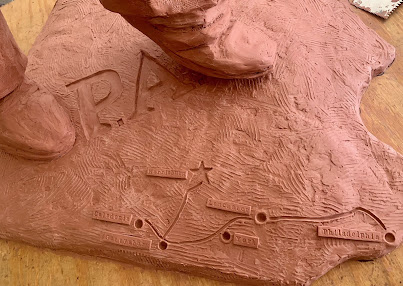The Thaddeus Stevens Zone and the Second Founding History Festival
December 2021
By Ross Hetrick
In the heart of Gettysburg is the Thaddeus Stevens Zone, a block that is steeped in history and the perfect place to hold a Second Founding History Festival.
Appropriately enough, the zone is on the first block of West Stevens Street between Carlisle Street and Washington Street. At one end at the corner of Stevens and Carlisle is the historic McPherson mansion. At the other end at Stevens and Washington is the entrance to Gettysburg College and Pennsylvania Hall -- which was paid for with a state grant that Stevens secured for the college in 1834. Between these two historic buildings are a few college administrative buildings and parking lots, making it the perfect area for an outdoor festival.
The McPherson mansion is Gettysburg's greatest unheralded historical treasure. The ancestral home of one of Gettysburg's first families, the complex of buildings sits in pristine 19th century condition, practically unused since it was bought by Gettysburg College in 2018.
The history of the McPherson family was intertwined with Thaddeus Stevens and Gettysburg throughout the 1800s. John B. McPherson was a close business associate of Stevens and was involved in starting Gettysburg Bank and the Maria iron furnace in Fairfield. His son, Edward McPherson grew up in the shadow of Stevens's illustrious career and some historians have said Stevens was like a second father to Edward. And Stevens was a major influence, helping him to become a lawyer, congressman, newspaper editor and then clerk of the House of Representatives in 1863, where he played a critical role in American history.
At the direction of Stevens and the Republican caucus, McPherson on December 4, 1865 omitted the names of ex-Confederates when he called the roll of the new Congress. Despite protests by the southerners and their allies, Stevens through a parliamentary maneuver was able to make the ban stick. Thus started Reconstruction which saw the passage of Constitutional amendments requiring equal treatment under the law, extension of civil rights to the state level and expansion of voting rights.
At the other end of the Stevens Zone is Pennsylvania Hall, a monument to Stevens's devotion to education. After it was founded in 1832, Gettysburg College, then called Pennsylvania College, tried to get state help to build its first building. As a member of the Pennsylvania legislature, Stevens was successful in 1834 in getting a $18,000 grant, but not without severe political backlash. "Let demagogues note it for future use," Stevens responded, "and send it on the wings of the wind to the ears of every one of my constituents, in matters of this kind, I would rather hear the approving voice of one judicious, intelligent, and enlightened mind, than to be greeted by the loud huzzahs of the whole host of ignorance."
Stevens went on to provide the land for the campus at a price determined by the college's board and to serve on the board until his death in 1868. He also prevented the college from moving away from Gettysburg in 1854.
With such historic attributes, the Stevens Zone is the perfect place to hold the Second Founding History Festival -- a celebration of the start of the transformation of America to a more equal and representative country during the Civil War and Reconstruction. Besides the connection with Stevens and McPherson, Gettysburg also has the distinction of Lincoln proclaiming the "new birth of freedom" in his Gettysburg Address.
This could be a collective project of the history and social groups in Adams County. The event could be held in late July to coincide with the anniversary of the ratification of 14th Amendment and there could be historic skits, lectures, food vendors, and information booths for participating groups.
Perhaps Gettysburg could eventually be as associated with the Second Founding as Philadelphia is the home of the First Founding in the late 1700s.
Ross Hetrick is president of the Thaddeus Stevens Society, which is dedicated to promoting Stevens's important legacy. More information about the Great Commoner can be found at the society's website: https://www.thaddeusstevenssociety.com/













